Discovering Qufu Mingsan Kong: A Journey into Confucian Heritage
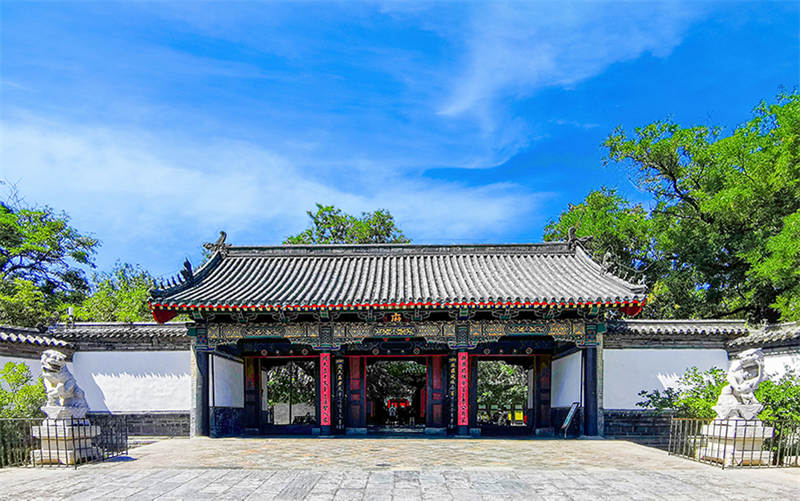
An Essential Guide to Visiting Qufu Mingsan Kong
In This Guide
- An Essential Guide to Visiting Qufu Mingsan Kong
- The Rich History and Legends of Qufu Mingsan Kong
- Main Highlights: What You Absolutely Can’t Miss
- Planning Your Visit: A Practical Guide
- Tickets: Prices, Booking, and Tips
- How to Get There: A Complete Transportation Guide
- Local Cuisine and Accommodation Nearby
- Frequently Asked Questions
- Final Thoughts on Your Trip
Discovering the Heart of Confucianism in Qufu
Nestled in the scenic Shandong Province, Qufu stands as a testament to the enduring legacy of one of history’s greatest philosophers—Confucius. This ancient city, revered as the “Hometown of Confucius,” invites travelers to explore its rich cultural heritage and historical significance. Here, visitors can immerse themselves in the profound teachings of Confucianism, a philosophy that has shaped Chinese society for over two millennia.
As you wander through the city’s storied streets, you’ll encounter the Three Confucius Sites—the Temple of Confucius, the Kong Family Mansion, and the Cemetery of Confucius—collectively known as the San Kong. These UNESCO World Heritage sites not only showcase remarkable ancient architecture but also embody the essence of Confucian thought, offering an unparalleled glimpse into the life and influence of this iconic figure.

Qufu Mingsan Kong.
But Qufu is more than just a destination for philosophical exploration; it is a vibrant tapestry of ancient civilization. With roots tracing back to the Dawenkou and Longshan cultures, Qufu has been a cradle of human activity for thousands of years. The remnants of royal dynasties, rituals, and scholarly pursuits echo through its temples and relics, making it a living museum of Chinese history.
As you delve deeper into Qufu, you’ll also discover its culinary delights, particularly the famed Kongfu Banquet—a feast that pays homage to the region’s storied past and its culinary artistry. This is not just a meal; it is an experience steeped in tradition, designed to honor guests with exquisite flavors and presentations.
Whether you are a history buff, a philosophy enthusiast, or a culinary explorer, Qufu offers an enriching journey into the heart of Chinese culture. Prepare to be captivated by its ancient wisdom, architectural wonders, and the lively spirit of a city that has long been a beacon of learning and respect. Welcome to Qufu—where the past is not just remembered, but lived.
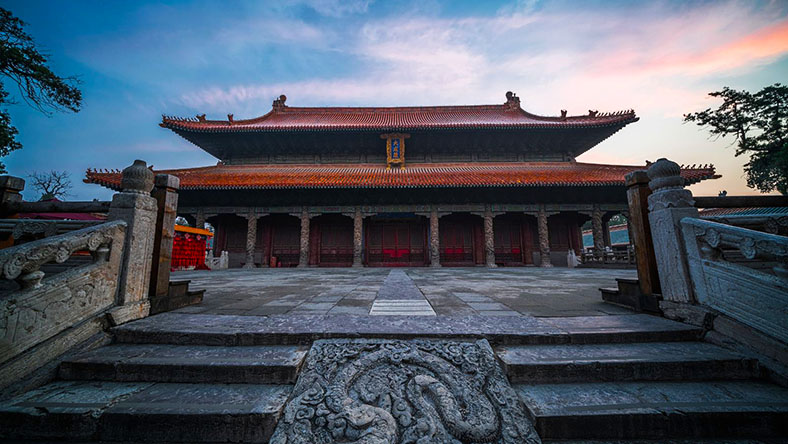
Qufu Mingsan Kong.
The Rich History and Legends of Qufu Mingsan Kong
Qufu, often referred to as the birthplace of Confucius, stands as a testament to the profound philosophical and cultural heritage of China. Nestled in Shandong Province, this city is not only significant for being the home of the great philosopher but also for its rich tapestry of history and legend that spans thousands of years. At the heart of Qufu’s historical legacy are the Three Confucius Sites, collectively known as Mingsan Kong. These sites—the Temple of Confucius, the Kong Family Mansion, and the Cemetery of Confucius—are UNESCO World Heritage Sites that embody the essence of Chinese civilization and Confucian ideals.
The Temple of Confucius (Kong Miao)
Constructed in the year 478 BC, the Temple of Confucius is one of the oldest and most significant Confucian temples in the world. It was established to honor Confucius and to serve as a place for worship and education. Over the centuries, the temple has undergone numerous renovations and expansions, reflecting the evolving architectural styles and reverence for Confucian teachings.
Legends and Traditions:
– According to legend, the temple was built on the site where Confucius taught his disciples. It is said that the original structure was modest, but as Confucianism gained prominence, the temple transformed into a grand complex, symbolizing the enduring influence of Confucian thought.
– The temple houses many ancient artifacts, including stone tablets inscribed with Confucian texts and historical records, some dating back to the Han Dynasty. The inscriptions are not just relics; they are revered as windows into the philosophical foundations laid by Confucius.
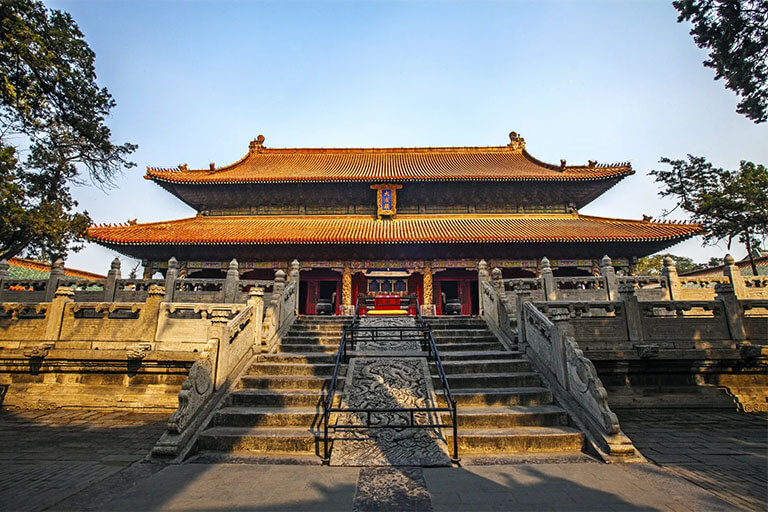
Qufu Mingsan Kong.
The Kong Family Mansion (Kong Fu)
Adjacent to the Temple of Confucius lies the Kong Family Mansion, which served as the residence of Confucius’ descendants for generations. This mansion is a prime example of traditional Chinese architecture, featuring intricate carvings and spacious courtyards.
Historical Significance:
– The mansion is a symbol of the Kong family’s enduring legacy, which has been pivotal in preserving Confucian teachings and practices. It is believed that Confucius’ descendants played a crucial role in the establishment and expansion of Confucian academies throughout China.
– The mansion also contains a wealth of artifacts, including family heirlooms and documents, that provide insights into the daily life and rituals of the Kong family, illuminating the personal aspect of Confucianism.
The Cemetery of Confucius (Kong Lin)
The Cemetery of Confucius, known as Kong Lin, is the final resting place of Confucius and many of his descendants. Spanning over two square kilometers, this serene site is characterized by its ancient trees, stone tablets, and the iconic tomb of Confucius.
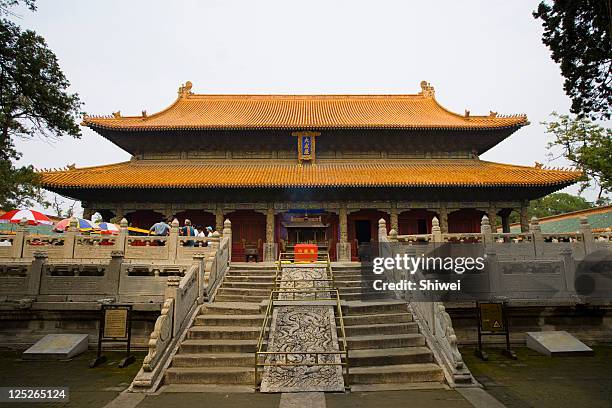
Qufu Mingsan Kong.
Legends and Cultural Practices:
– Local legend holds that the cemetery’s trees were planted by Confucius himself, symbolizing the intertwining of nature and philosophy. The whispering leaves are often thought to carry the wisdom of Confucius to those who visit.
– The cemetery is not merely a resting place; it is a pilgrimage site for scholars and followers of Confucianism. Every year, thousands visit to pay their respects, especially during the Confucius Ceremony held on September 28th, commemorating his birthday.
A Legacy of Confucianism
The rich history of Qufu and the Mingsan Kong is also intertwined with the development of Confucianism, which has profoundly influenced Chinese culture, governance, and social structure. The teachings of Confucius emphasize morality, the importance of education, and respect for tradition, principles that continue to resonate in modern Chinese society.

Qufu Mingsan Kong.
Conclusion
Visiting Qufu and the Mingsan Kong sites offers an unparalleled opportunity to connect with the philosophical roots of Chinese civilization. The history and legends that permeate these sites invite travelers to reflect on the teachings of Confucius and their relevance today. As you wander through the ancient halls of the Temple, the majestic rooms of the Mansion, and the tranquil paths of the Cemetery, you will find yourself immersed in the legacy of a culture that has shaped the thoughts and lives of millions for over two millennia.
Main Highlights: What You Absolutely Can’t Miss
When visiting Qufu, the birthplace of Confucius and a cradle of Chinese civilization, there are several key sites and experiences that you absolutely cannot miss. Each highlight offers a unique glimpse into the rich tapestry of Confucian philosophy, ancient architecture, and cultural heritage that defines this remarkable city.
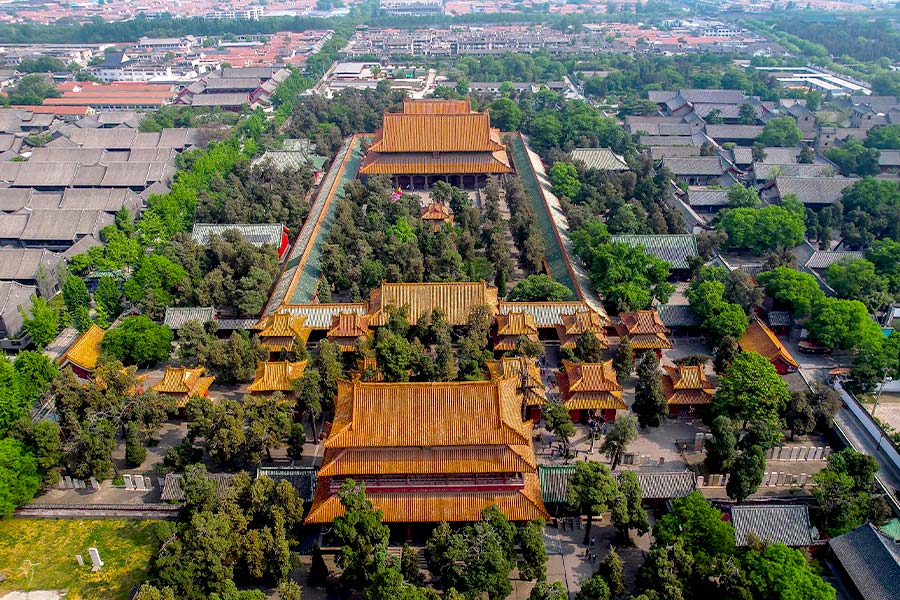
Qufu Mingsan Kong.
1. Temple of Confucius (Kong Miao)
This grand temple complex is one of the largest and most historically significant in China, dedicated to the memory of Confucius. Built in 478 BC, the temple showcases stunning architecture with intricate carvings and vast courtyards. As you wander through the halls, you’ll encounter various altars, statues, and stone tablets that honor Confucius and his teachings. The serene atmosphere invites reflection on the profound impact of his philosophy on Chinese culture and beyond.
2. Kong Family Mansion (Kong Fu)
Adjacent to the Temple of Confucius, the Kong Family Mansion served as the residence of Confucius’s descendants for generations. This impressive structure combines residential and administrative functions and is a prime example of traditional Chinese architecture. Explore the beautifully preserved rooms and gardens, which offer insights into the life and status of Confucius’s family throughout the dynasties. The mansion is a treasure trove of artifacts, including calligraphy, paintings, and historical documents.
3. Cemetery of Confucius (Kong Lin)
A short walk from the Temple and Mansion lies the serene Cemetery of Confucius, where he and many of his descendants are buried. This peaceful site, surrounded by ancient cypress trees, is steeped in ritual significance. The highlight is Confucius’s tomb itself, marked by a simple mound that reflects his humble philosophy. The cemetery is not only an important pilgrimage site but also a place where visitors can appreciate the beauty of nature intertwined with history.
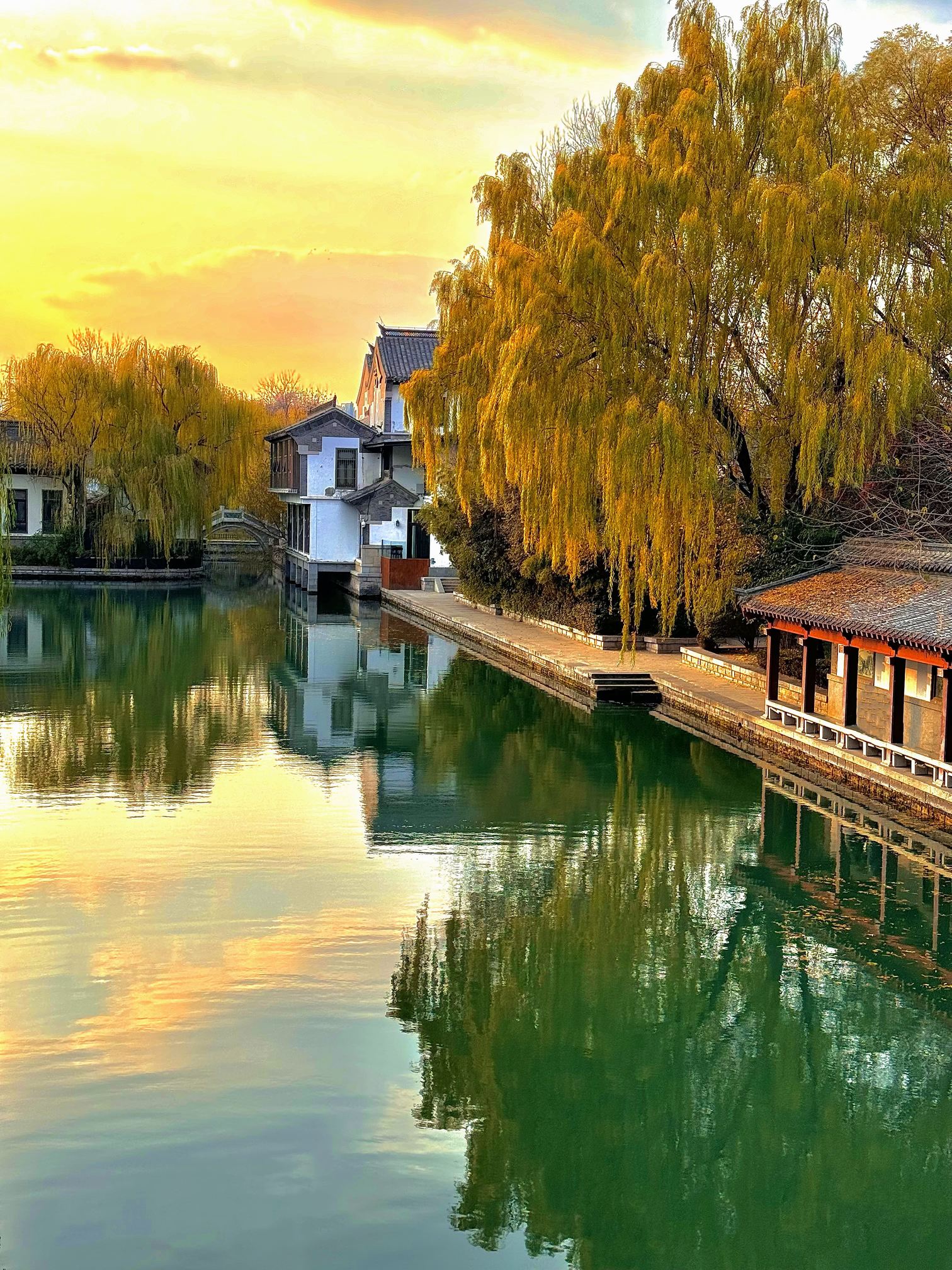
Qufu Mingsan Kong.
4. Confucius Six Arts City
For those looking to delve deeper into Confucian culture, the Confucius Six Arts City offers interactive experiences and classes that explore the traditional arts of Confucianism, including music, calligraphy, archery, and etiquette. This immersive experience allows travelers to engage with the teachings of Confucius in a practical way, gaining a deeper understanding of the values that shaped Chinese civilization.
5. Qufu’s Rich Archaeological Heritage
Qufu is home to numerous archaeological sites that reveal its long-standing history, including remnants of the Dawenkou and Longshan cultures. These ancient relics date back to 4,300 BC, showcasing the region’s significance as a center of early human activity. Take the time to visit local museums featuring these artifacts to appreciate the depth of Qufu’s ancient civilization.
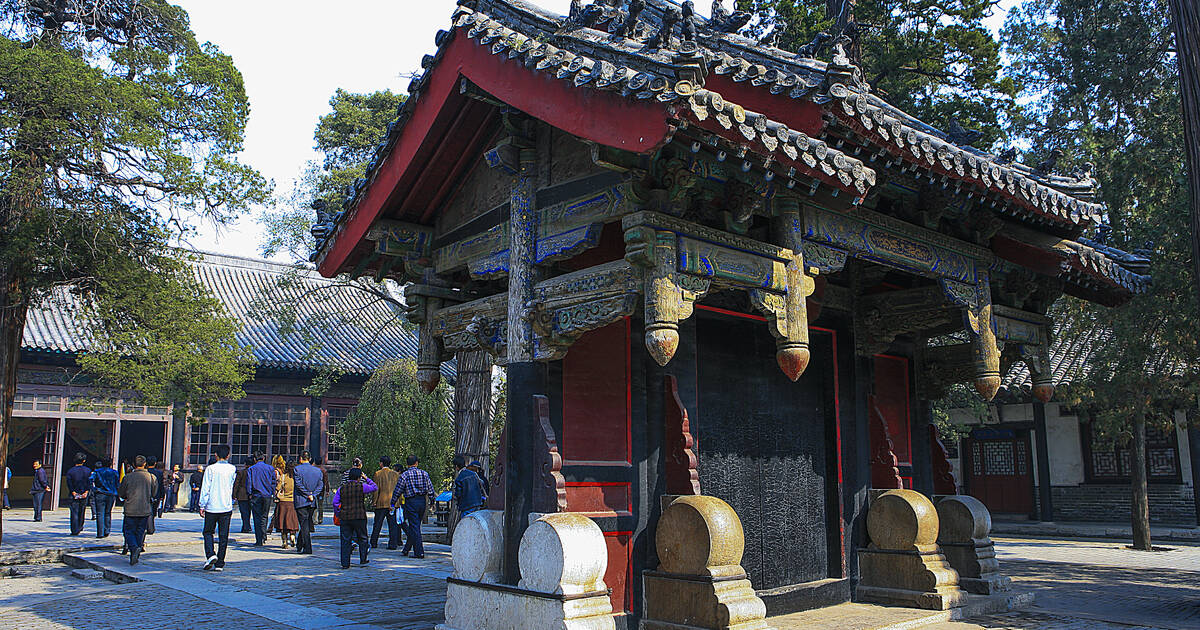
Qufu Mingsan Kong.
6. The Kongfu Banquet
No visit to Qufu would be complete without experiencing the exquisite Kongfu Banquet, a culinary tradition that dates back to the 3rd century BC. This feast features an array of high-quality ingredients and time-honored cooking techniques that showcase the essence of Shandong Cuisine. The banquet is not only a gastronomic delight but also a cultural event, reflecting the hospitality and ceremonial traditions rooted in Confucian values.
7. Local Festivals and Ceremonies
If your timing is right, try to participate in one of Qufu’s local festivals or ceremonies, such as the Confucius Memorial Ceremony, held annually on September 28th to honor his birthday. These events offer a vibrant display of traditional music, dance, and rituals that have been preserved over centuries, allowing visitors to witness the living legacy of Confucian culture.
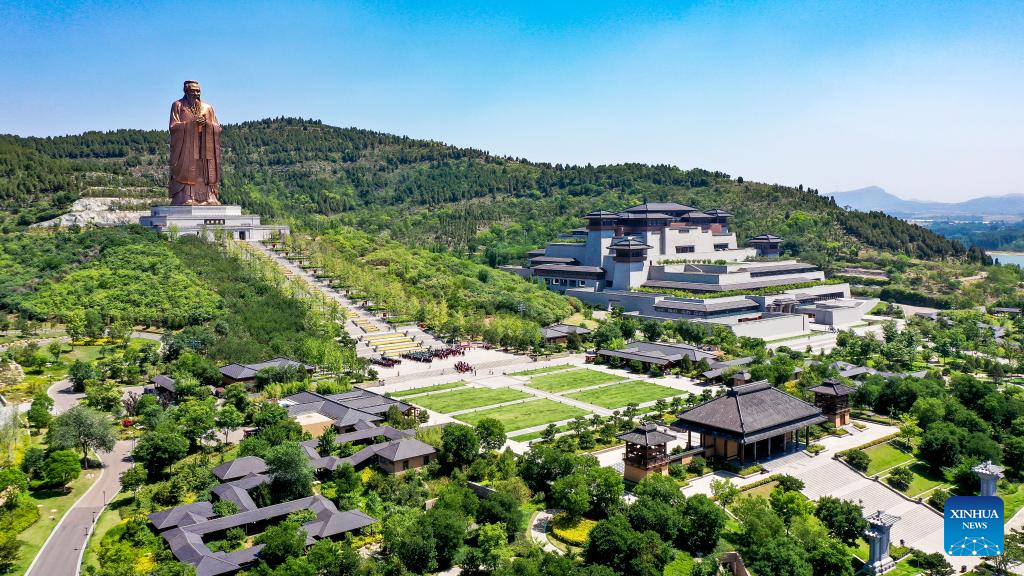
Qufu Mingsan Kong.
Conclusion
Qufu is a city that resonates with the echoes of history and philosophy, making it a must-visit destination for anyone interested in Chinese culture. From the sacred sites of Confucius to the culinary delights of the Kongfu Banquet, each highlight provides a deeper understanding of the values that have shaped not only China but also the broader world. Plan your visit to ensure you don’t miss these essential experiences!
Planning Your Visit: A Practical Guide
Getting Ready for Your Journey to Qufu Mingsan Kong
If you’re seeking a deep dive into Chinese history and culture, a visit to Qufu Mingsan Kong (济宁曲阜明故城三孔旅游区) is a must. Renowned as the birthplace of Confucius and home to three UNESCO World Heritage Sites—the Temple of Confucius, the Kong Family Mansion, and the Cemetery of Confucius—Qufu offers an enriching experience that connects visitors with the profound legacy of Confucianism. Here’s a practical guide to help you plan your trip effectively.

Qufu Mingsan Kong.
Best Time to Visit
Spring (April to June) and Autumn (September to November) are ideal for visiting Qufu. During these months, the weather is mild and pleasant, perfect for exploring outdoor sites. Summer can be hot and humid, while winter may bring cold temperatures, which might limit your outdoor activities.
Getting There
- By Air: The nearest major airport is Jinan Yaoqiang International Airport (about 150 km away). From there, you can take a train or a bus to Qufu.
- By Train: Qufu is well-connected by rail. High-speed trains frequently run from major cities like Beijing (approximately 5 hours) and Shanghai (around 6 hours).
- By Bus: If you prefer road travel, several long-distance buses operate from cities in Shandong Province and beyond.
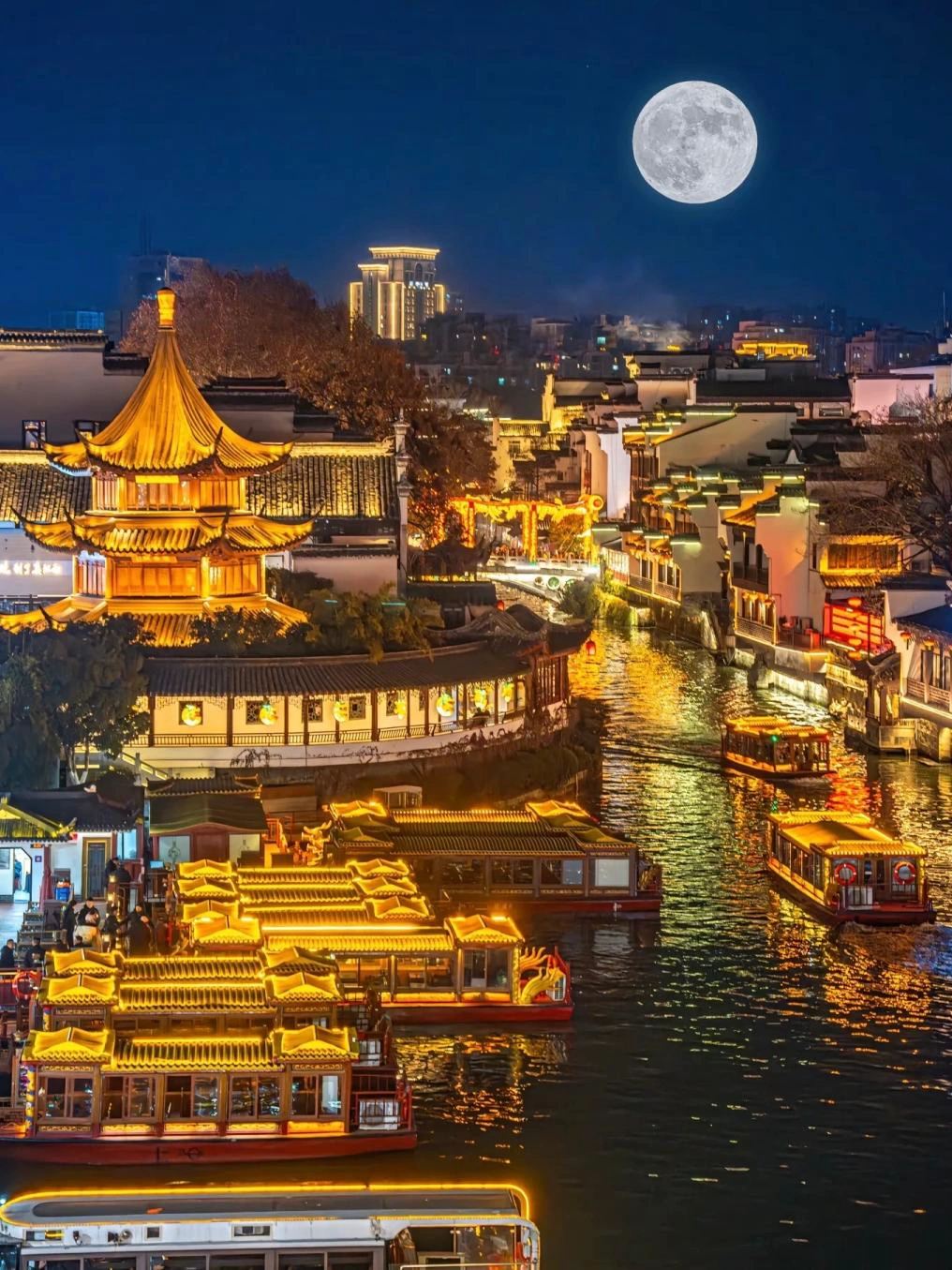
Qufu Mingsan Kong.
Local Transportation
Once in Qufu, local transportation includes:
– Bicycles: Renting a bike is a great way to explore the city and its surroundings at your own pace.
– Taxis and Ride-Sharing: Available for convenient travel within the city.
– Walking: Many historical sites are within walking distance of each other, making it easy to explore on foot.
Where to Stay
Qufu offers a range of accommodations to suit different budgets. Here are some recommendations:
– Luxury: For a lavish experience, consider the Qufu Shangri-La Hotel, which provides modern amenities alongside traditional decor.
– Mid-range: The Qufu Hotel offers comfortable rooms and is centrally located, making it easy to access major attractions.
– Budget: For budget travelers, hostels and guesthouses like Qufu Youth Hostel provide affordable options with a local touch.
Must-See Attractions
-
Temple of Confucius (Kong Miao): This grand complex is a testament to Confucius’s influence on Chinese culture. Don’t miss the intricately designed pavilions and the huge stone stele inscriptions.
-
Kong Family Mansion (Kong Fu): Explore the residence of Confucius’s descendants, showcasing exquisite architecture and rich history.
-
Cemetery of Confucius (Kong Lin): This serene site is where Confucius was laid to rest. The cemetery is dotted with ancient cypress trees and stone tablets, creating a peaceful atmosphere for reflection.
-
Confucius Six Arts City: An educational venue where visitors can learn about traditional Confucian rituals and arts, offering classes on etiquette and cultural practices.

Qufu Mingsan Kong.
Local Cuisine
No visit to Qufu is complete without tasting the Kongfu Banquet, famed for its exquisite Shandong cuisine. This traditional banquet features high-quality ingredients and elaborate cooking methods. Look out for local restaurants that offer this culinary experience.
Cultural Tips
- Etiquette: Familiarize yourself with basic Chinese customs, such as greetings and dining etiquette, to enhance your interactions with locals.
- Dress Code: Wear comfortable shoes, as you’ll be doing a lot of walking. Modest clothing is appreciated, especially when visiting religious sites.
- Language: While Mandarin is the primary language, learning a few basic phrases can enrich your travel experience.
Practical Information
- Currency: The currency used is the Chinese Yuan (CNY). It’s advisable to carry some cash, as not all places accept credit cards.
- Wi-Fi and Connectivity: Free Wi-Fi is widely available in hotels and some public areas. Consider purchasing a local SIM card for better connectivity.
- Safety: Qufu is generally safe for tourists, but as with any destination, stay vigilant and keep an eye on your belongings.
Final Thoughts
A visit to Qufu Mingsan Kong is more than just a trip; it’s an opportunity to connect with the foundations of Chinese civilization. By planning ahead and immersing yourself in the rich tapestry of Confucian culture, your journey will surely be memorable. Safe travels!
Tickets: Prices, Booking, and Tips
Exploring Ticket Options for Qufu’s Cultural Treasures
Visiting Qufu, the revered birthplace of Confucius, allows travelers to immerse themselves in a rich tapestry of history and culture. To make the most of your journey, understanding ticket prices, booking methods, and helpful tips will enhance your experience at the remarkable Qufu Mingsan Kong (济宁曲阜明故城三孔旅游区).
Ticket Prices
When planning your visit, be aware that ticket prices may vary based on the time of year and the specific sites you wish to explore. Here is a general outline of the admission fees:
- Temple of Confucius (Kong Miao): Approximately ¥150 (about $23).
- Kong Family Mansion (Kong Fu): Around ¥100 (about $15).
- Cemetery of Confucius (Kong Lin): Approximately ¥80 (about $12).
Combination Tickets are often available, granting access to all three sites at a discounted rate, typically around ¥280 (about $43).
Booking Your Tickets
Advance Booking: While tickets are available for purchase at each site, securing your tickets in advance is highly recommended, especially during peak tourist seasons (Spring and Autumn).
- Online Platforms: Tickets can be booked through various travel websites or directly from the official Qufu tourism site. This method often provides special offers and ensures you beat the queues.
- Local Tour Packages: Consider purchasing a tour package that includes transportation, guiding services, and entrance fees. This can provide a seamless experience, especially for international travelers unfamiliar with the area.
Helpful Tips for Visitors
- Visit Early: Arriving early in the day can help you avoid large crowds and enjoy a more tranquil experience while exploring the historical sites.
- Guided Tours: Engaging a local guide can enrich your visit significantly. They can provide insights into the profound cultural significance of each location, deepening your understanding of Confucian philosophy and its historical context.
- Prepare for Walking: The sites are expansive, so wear comfortable shoes and be prepared for a fair amount of walking. Bring water and snacks to keep your energy up during your explorations.
- Check Seasonal Events: Throughout the year, Qufu hosts various cultural events and festivals. Check local listings to see if your visit coincides with any special activities, such as traditional ceremonies or performances related to Confucian practices.
- Cash is King: While larger establishments may accept credit cards, many local vendors and smaller sites prefer cash. It’s wise to have some Chinese yuan on hand for convenience.
By understanding the ticketing process and planning ahead, your visit to Qufu’s historical sites will be both enriching and enjoyable. Embrace the opportunity to walk in the footsteps of one of history’s most influential figures and witness the cultural legacy that continues to shape Chinese society today.
How to Get There: A Complete Transportation Guide
Getting to Qufu Mingsan Kong: Your Transportation Guide
Visiting Qufu Mingsan Kong (济宁曲阜明故城三孔旅游区) is an enriching experience steeped in Chinese history and culture. Situated in Shandong Province, it is renowned as the birthplace of Confucius and is home to several UNESCO World Heritage Sites. Here’s how you can reach this historical gem with ease.
By Air
Nearest Airports:
– Jinan Yaoqiang International Airport (TAO): Located approximately 150 km from Qufu, this is the primary airport for international travelers. From here, you can take a direct train or a bus to Qufu.
– Qingdao Liuting International Airport (TAO): About 400 km away, Qingdao offers more international connections, but travelling to Qufu from here will take longer.
Transportation from Airports:
– Train from Jinan: The airport is well-connected to Jinan Railway Station. From there, you can catch a high-speed train to Qufu, which takes about 30 minutes.
– Airport Shuttle: Buses operate from Jinan Airport to Qufu, though this option may take longer.
By Train
High-Speed Rail:
Qufu is easily accessible via China’s extensive high-speed rail network. The city has its own railway station, Qufu East Railway Station (曲阜东站), which is well-connected to major cities.
- From Beijing: Take a high-speed train from Beijing South Railway Station to Qufu, which typically takes about 2.5 hours.
- From Shanghai: High-speed trains from Shanghai Hongqiao Railway Station to Qufu take approximately 4 hours.
- From Jinan: A short journey of around 30 minutes on a high-speed train.
Regular Train Services:
If you’re looking for a more budget-friendly option, regular trains are also available. Note that these may take significantly longer.
By Bus
Long-Distance Buses:
Buses are another viable option to reach Qufu, especially from nearby cities.
- From Jinan: Regular long-distance buses depart from Jinan’s central bus station to Qufu. The journey takes about 2 to 2.5 hours.
- From Tai’an: If you’re visiting Mount Tai, you can also catch a bus to Qufu, which takes around one hour.
By Car
Self-Driving:
If you prefer the flexibility of driving, renting a car is a great option. Qufu is well-connected via highways:
- From Jinan: Take the G3 Beijing-Taipei Expressway, which should take about 1.5 to 2 hours.
- From Qingdao: The journey from Qingdao is longer, approximately 4 to 5 hours, via the G20 Expressway.
Taxi Services:
Taxis are available from nearby cities, but this may be more costly compared to public transport.
Local Transportation in Qufu
Once you arrive in Qufu, getting around is quite manageable:
- Walking: Many of the key attractions, including the Temple of Confucius, Kong Family Mansion, and the Cemetery of Confucius, are within walking distance of each other.
- Bicycles: Renting a bicycle can be an enjoyable way to explore the city at a leisurely pace.
- Public Buses: Qufu has a local bus network that can take you to various attractions, but routes may be less frequent.
Tips for Travelers
- Language: While major transportation hubs may have English signage, it’s advisable to have the names of your destinations written in Chinese for ease of communication.
- Tickets: For trains, consider purchasing tickets in advance through online platforms or at railway stations, especially during peak travel seasons.
- Cash: Though mobile payments are prevalent, having some cash on hand for small purchases or local buses can be useful.
With this guide, you’ll be well-prepared to embark on your journey to Qufu Mingsan Kong, where history comes alive through the teachings of Confucius and the rich cultural heritage of this ancient city. Enjoy your travels!
Local Cuisine and Accommodation Nearby
Savoring Qufu: Culinary Delights and Comfortable Stays
As you immerse yourself in the rich history and culture of Qufu, don’t miss the opportunity to indulge in its local cuisine, particularly the renowned Kongfu Banquet. This exquisite dining experience is deeply rooted in Confucian traditions and showcases the best of Shandong cuisine. Here’s a guide to the must-try dishes and comfortable accommodations that will enhance your journey through this historical gem.
Local Cuisine
-
Kongfu Banquet (孔府宴)
This banquet, with origins dating back to the late 3rd century BC, is a feast fit for emperors. The banquet features a variety of meticulously prepared dishes, often using high-quality ingredients like fresh seafood, seasonal vegetables, and local meats. Dishes are not only delicious but also visually stunning, reflecting the artistry of Chinese culinary traditions. -
Shandong Cuisine (鲁菜)
Known for its emphasis on fresh ingredients, Shandong cuisine features dishes that highlight the natural flavors of the region. Some must-try dishes include: - Sweet and Sour Carp (糖醋鲤鱼): A classic dish that exemplifies the balance of sweet and sour flavors, often garnished with colorful vegetables.
- Braised Chicken with Mushrooms (茸鸡炖蘑菇): Tender chicken slow-cooked with earthy mushrooms, showcasing the region’s rich agricultural produce.
-
Pork with Sweet Bean Sauce (甜面酱猪肉): Succulent pork cooked in a fragrant sweet bean sauce, served with fresh pancakes for wrapping.
-
Street Food and Snacks
Don’t overlook the local street food scene! Sample Jinan-style fried dumplings and scallion pancakes at nearby stalls, or try a bowl of comforting beef noodle soup, infused with local spices and herbs.
Accommodation Options
After a day of exploring the historic sites, unwind in one of these excellent accommodations that blend comfort with cultural charm:
-
Qufu Shuyuan Hotel (曲阜书院酒店)
Located just a stone’s throw from the Confucius Temple, this hotel offers a serene atmosphere and traditional Chinese decor. The hotel features comfortable rooms, a restaurant serving local cuisine, and beautiful gardens perfect for a quiet stroll. -
Kong Family Mansion Hotel (孔府大酒店)
With its proximity to the Kong Family Mansion and the Confucius Cemetery, this hotel provides a blend of modern amenities and historical ambiance. Guests can enjoy spacious rooms, a fitness center, and a restaurant that serves delicious local dishes. -
Qufu International Hotel (曲阜国际饭店)
This hotel boasts a central location and a variety of room types to suit different budgets. It offers a range of amenities including a business center, dining options featuring Shandong cuisine, and easy access to local attractions. -
Ancient City Hotel (古城酒店)
A charming option that echoes the architectural style of ancient Qufu, this hotel provides an authentic experience. Guests can enjoy comfortable accommodations and a complimentary breakfast featuring local specialties.
Conclusion
Qufu is not only a destination steeped in Confucian history but also a culinary delight waiting to be explored. From the exquisite Kongfu Banquet to the charming accommodations that reflect the region’s cultural heritage, your visit to Qufu will be a feast for the senses. Embrace the flavors and comfort that this historic city has to offer as you delve deeper into the wisdom of Confucius.
Frequently Asked Questions
Essential Information for Your Visit to Qufu Mingsan Kong
1. What are the main attractions in Qufu?
Qufu is renowned for its rich Confucian heritage and is home to three UNESCO World Heritage Sites:
– Temple of Confucius (Kong Miao): A grand complex dedicated to the great philosopher Confucius.
– Kong Family Mansion (Kong Fu): The historical residence of Confucius’ descendants, showcasing traditional architecture and artifacts.
– Cemetery of Confucius (Kong Lin): The resting place of Confucius and many of his descendants, surrounded by serene landscapes.
2. How do I get to Qufu?
Qufu is accessible via multiple modes of transportation:
– By Train: High-speed trains connect Qufu with major cities like Beijing and Shanghai. The Qufu East Railway Station is the primary hub.
– By Air: The nearest major airport is Jinan Yaoqiang International Airport, approximately 150 km away. From there, you can take a train or taxi to Qufu.
– By Bus: Various intercity bus services operate from surrounding cities, including Jinan.
3. What is the best time to visit Qufu?
The ideal times to explore Qufu are during spring (April to June) and autumn (September to November). During these seasons, the weather is mild and pleasant, perfect for walking through the historical sites. Avoid visiting during the peak of summer when temperatures can soar.
4. Are there guided tours available?
Yes, many travel agencies offer guided tours of Qufu. These tours often include visits to the three main sites, cultural experiences, and knowledgeable guides who can provide insights into Confucian philosophy and history. Tailor-made tour packages are also available to suit your preferences.
5. What cultural experiences can I expect in Qufu?
Visitors can immerse themselves in various cultural experiences, such as:
– Confucian Etiquette Classes: Learn about traditional rituals and practices.
– Kongfu Banquet: Enjoy a traditional Shandong cuisine feast prepared with high-quality ingredients.
– Calligraphy Workshops: Participate in sessions to learn the art of Chinese calligraphy, a significant aspect of Confucian culture.
6. What should I wear when visiting Qufu?
Comfortable walking shoes are recommended as you will be exploring outdoor sites. Dress modestly out of respect for the cultural significance of the locations. Lightweight, breathable clothing is ideal for the warmer months, while layers may be necessary in cooler seasons.
7. Is there accommodation available in Qufu?
Qufu offers a range of accommodation options, including:
– Luxury Hotels: High-end hotels equipped with modern amenities.
– Boutique Hotels: Smaller, character-filled options that provide a more intimate experience.
– Guesthouses and Hostels: Budget-friendly choices for travelers looking for a more local experience.
8. What are the dining options in Qufu?
Qufu is famous for its culinary offerings, particularly the Kongfu Banquet which features traditional Shandong cuisine. You can also find:
– Local restaurants serving authentic Chinese dishes.
– Street food stalls offering quick bites.
– Cafés and tea houses for light refreshments and traditional teas.
Exploring Qufu promises an enriching journey into the heart of Confucian culture and ancient Chinese civilization. Enjoy your visit!
Final Thoughts on Your Trip
As you conclude your journey through Qufu, the birthplace of Confucius and a beacon of Chinese culture, reflect on the profound experiences that have unfolded within this storied city. Here, the echoes of ancient wisdom resonate through the Temple of Confucius, the serene Cemetery, and the illustrious Kong Family Mansion—each a testament to the enduring legacy of one of history’s greatest philosophers.
Embrace the Legacy
Your visit to Qufu allows you to step into a world where philosophy, ritual, and tradition intertwine seamlessly. Whether you have wandered through the tranquil gardens, marveled at the intricate architecture, or savored the exquisite Kongfu Banquet, Qufu has undoubtedly offered a glimpse into the heart of Confucian thought and its impact on Chinese civilization.
Take the Experience with You
As you leave, carry with you not just memories of the sights and tastes, but also the essence of Confucius’ teachings—values of respect, humility, and the importance of learning. Engage with these principles in your everyday life, and let them inspire you to seek wisdom and understanding in your own journey.
A Destination Worth Revisiting
Qufu is not just a destination; it’s an invitation to dive deeper into Chinese history and culture. With its rich tapestry of ancient relics and vibrant traditions, Qufu promises that each visit will reveal something new, further enriching your understanding of this remarkable place.
Thank you for exploring Qufu with us; may your travels continue to be filled with discovery and inspiration! Safe travels as you venture onward!